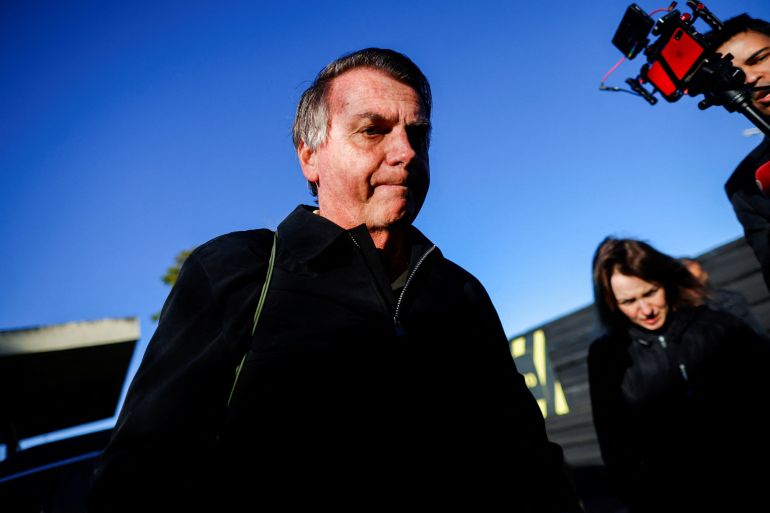Brazil court votes to bar Bolsonaro from office until 2030
Majority on Brazilian electoral court finds former far-right President Jair Bolsonaro guilty of abuse of power.

A majority on Brazil’s highest electoral court has voted to bar former President Jair Bolsonaro from public office until 2030 over his conduct during last year’s tightly contested elections.
The seven-member Superior Electoral Tribunal (TSE) voted five-to-two on Friday to convict the far-right leader of abuse of power in his push to cast doubt on the South American country’s electronic voting system.
Keep reading
list of 3 itemsBrazil judge orders Bolsonaro to testify about capital attack
Bolsonaro back in Brazil after three months in the US
Bolsonaro has been accused of rallying his supporters to reject his narrow loss to left-wing President Luiz Inacio Lula da Silva in the October elections, culminating in an assault on government buildings earlier this year.
The court’s decision – once voting of all the justices concludes – means that Bolsonaro will not be able to contest the presidential elections in 2026, dealing a massive blow to the 68-year-old’s political future.
On Friday, he described the decision as a “stab in the back” and pledged to keep working to advance right-wing politics in Brazil.
In an interview with the Itatiaia radio station before Friday’s judgment, Bolsonaro also rejected any wrongdoing. “I have not attacked the voting system; I just showed its possible flaws,” he said. “This trial doesn’t make any sense.”
Al Jazeera’s Monica Yanakiew, reporting from Rio de Janeiro, said the former president has already signalled he plans to appeal up to the Brazilian Supreme Court, but it is unlikely that the court would rule in his favour.
“This decision means that he won’t be able to run for office until 2030,” Yanakiew said on Friday.
“That doesn’t mean that he is not a political player,” she added. “He still has a lot of popularity.”
The case focused on a July 18, 2022, meeting in which Bolsonaro used government staffers, the state television channel and the presidential palace in Brasilia to tell foreign ambassadors that the country’s electronic voting system was rigged.
The lead justice in the case, Benedito Goncalves, said earlier this week that Bolsonaro had “used the meeting with ambassadors to spread doubts and incite conspiracy theories”.
“He instigated a belief that there was a real threat the results of the 2022 election would be adulterated,” Goncalves said. “It was extremely harmful to the democratic environment.”
A former army captain, Bolsonaro narrowly lost last year’s presidential elections, securing 49.1 percent of the vote compared with Lula’s 50.9 percent.
Bolsonaro repeatedly cast doubt on Brazil’s voting system in the lead-up to the contest, alleging without any evidence that it was vulnerable to massive fraud.
Critics said his campaign mirrored the tactics of former US President Donald Trump – whom Bolsonaro had emulated – and many accused the ex-Brazilian president of fomenting a nationwide movement to overturn the results.
Bolsonaro’s supporters erected road blockades and organised protests following his defeat, and on January 8, a mob of thousands stormed Brazil’s Congress, Supreme Court and presidential palace in an effort to contest Lula’s new administration.
Carlos Melo, a political science professor at Insper University in Sao Paulo, said the electoral court’s decision on Friday “will end Bolsonaro’s chances of being president again, and he knows it”.
“After this, he will try to stay out of jail, elect some of his allies to keep his political capital, but it is very unlikely he will ever return to the presidency,” Melo told The Associated Press.
While Bolsonaro does not risk jail in the electoral case, he is separately facing multiple criminal investigations that could put him behind bars.
Meanwhile, Brazilian Justice Minister Flavio Dino celebrated the electoral court’s decision.
“Some important messages come from the TSE trial: lying is not a legitimate tool for exercising a public function and politics is not governed by the law of the jungle,” Dino tweeted. “Democracy has overcome its toughest stress test in decades.”